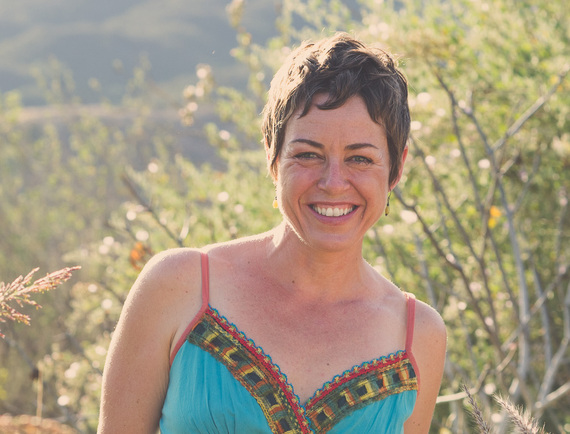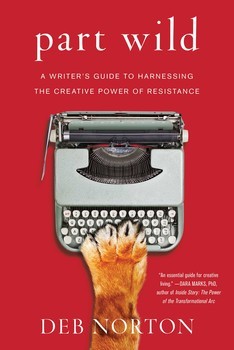Eighty percent of people want to write a book. But only a few ever complete the task. Why? Writing coach Deb Norton helps writers harness their creativity.
We come pre-loaded with a creative spark that drives us to innovate, explore, express, and make our unique contribution to the world. Often, though, that drive doesn't get us very far down the road before it runs right smack into resistance─the mysterious force that thwarts creativity. Writing coach Deb Norton tells us that resistance needn't be the enemy of writing─or any other creative endeavor. Her brilliant book Part Wild (Atria/Enliven, September 2016) is a must-read for any aspiring or seasoned writer, choke full with ingenious prompts and prolific ideas how to harness that wild creative spark within us.
Michaela Haas: What is the biggest reason people don`t fulfill their dream to write a book and how can your book Part Wild help?
Deb Norton: While there are a million reasons─early discouragement or creative shaming, perfectionism, doubt, practical concerns─they all roll into one big reason: resistance. But the problem is not that we have resistance, the problem is we don't work productively with it. We fight it, we try to defeat or overcome it with discipline, steely-stare it down, and push our way through it, and that's just really exhausting and we then don't have any energy leftover for the work.
Are you seriously telling me that I don't need to be disciplined to finish my book?
When you first start writing, there are a lot "have tos" and "musts" coming at you, as in, "You have to be disciplined, write every day, write 500 words a day, ..." or "You must have passion, must dream big, must have a room of your own, must find your voice..." and, of course, "you must be nuts." There's a lot of advice about who you have to be, but none about figuring out who you actually are. Because I can tell you what a lot of people aren't: they aren't disciplined.
I have met disciplined people, I know they exist─but if you're not, it's okay. You have other superpowers that will help you get your creative work done. The most powerful is curiosity. Curiosity is more long-burning than discipline, more powerful than passion, and it slices through resistance like Michael Phelps through water. When you're curiosity hooks into something, it doesn't matter if you don't have time; you'll find time. If you're genuinely interested in jellyfish, roadie culture, the nature of good and evil, or your own past, your curiosity will drive you to pick up a pen or a paintbrush and investigate.
How can creative resistance, something that sounds so debilitating, actually be a powerful tool for artists?
Creative resistance emanates from the "tame" part of our nature, the part that likes to be safe and accepted. Resistance is risk averse. It does not want you to dance like nobody is watching because what if somebody is. The tame side isn't bad; it helps us keep a job and stay out of jail, and other important stuff.
But when the tame side takes over and resistance subdues our creative impulses, then there's trouble. I mean, even if you don't want a career in the creative arts, you still need access to your creativity for day-to-day problem solving and enjoyment of life, right? You don't want to be cut off from your playfulness and inspiration.
So, resistance is a very powerful force, yes, because it's hooked into our safety and survival, but like any other force, like gravity or electricity, it can be harnessed. And the key to harnessing a force is understanding it. For instance, you can't harness the watts to make toast if you don't first understand how electricity works. Or think of archery - before an arrow could hit a bulls eye, the archer must master the bow, which is basically a resistance machine.
Can writers really leverage fear, boredom, and other creativity-killing emotions, to benefit the writing process? How?
Absolutely, take fear for instance. That's a biggie. Fear of falling short, of failing, of public embarrassment. Fear can stop us before we start. On the other hand, fear can be harnessed, like a truffle pig, to take you directly to the heart of what you need to explore. We fear what we don't understand and creativity is our best tool for exploring what we don't understand. So, fear and creativity can work hand in hand, if you become curious about the thing that fear is trying to steer you clear of. The trick is to question the fear rather than outright obeying it.
You talk about getting to know your inner critic. Ew! I just want mine to go away! What good can come of getting to know them?
You know what they say about keeping your enemies close? The inner critic controls us from the back seat, not out-and-out grabbing the wheel, but muttering those passive-aggressive comments at just the right moments to make you wonder why anybody ever thought it was a good idea to issue you a driver's license. Of course it's not our first instinct to tune into them; they can be really toxic. But, every time you turn to them and ask, "What did you say?" they shrink a little and, more importantly, you realize they aren't an expert on writing or on being a hot item or a good person or finding love. They're just an expert on being a small target, which is not going to help you with your creative efforts. If you really listen, soon enough it stops feeling like it means anything about you and your work and it just sounds like the muttering it is.
In the book you describe something you call the "Inner Champion." What is it and how do I get one?
It's funny how folks buy into the inner critic, but suggest that they also have an Inner Champion and watch the eyes roll. The Inner Champion is that still small voice, your higher self, your intuition - whatever you want to call it, it's enormously useful to your creative work. Unfortunately, it can be hard to hear because we've been so tuned into the inner critic. The inner critic tells you what could go wrong. The inner champion sees the big picture, sees your value, knows when you're operating on all cylinders and champions your potential rather than questioning it. This truer internal voice comes from the wild part of you, the part that is connected to the natural world and to your truer instincts. We all have both voices within us. It's a matter of, "Who are you going to listen to?"


